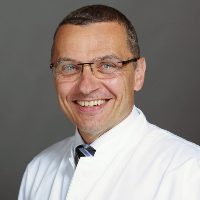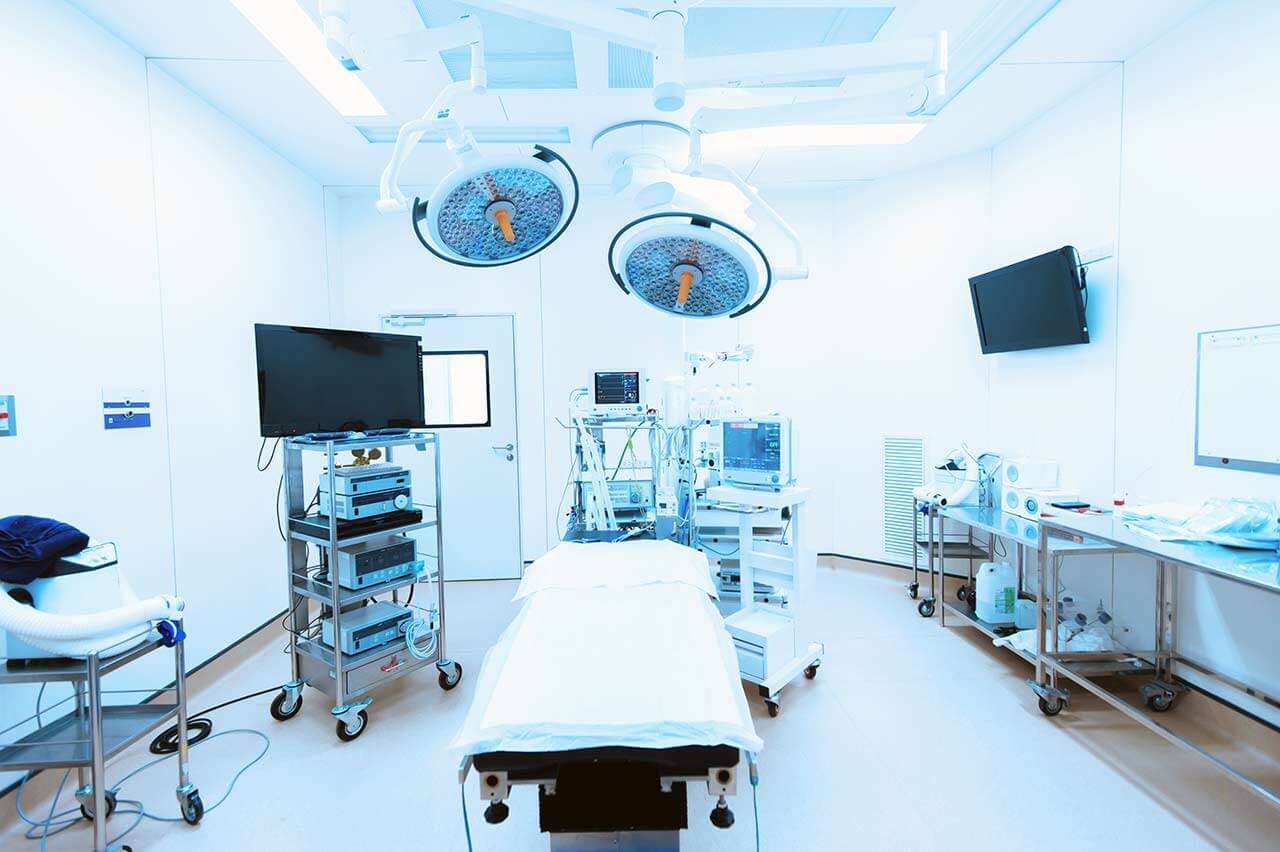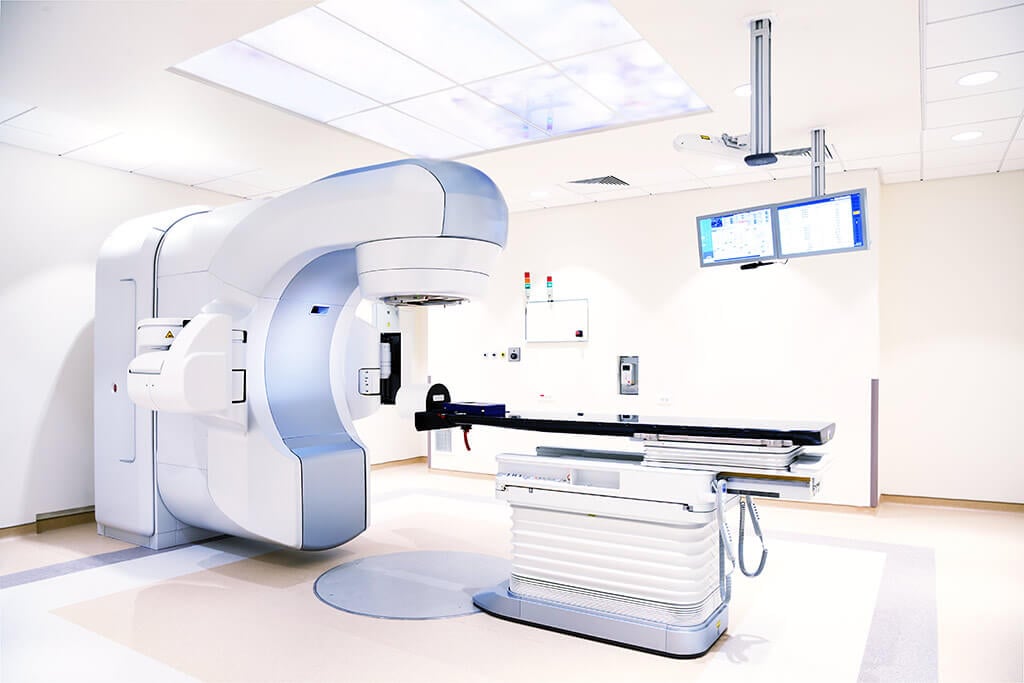
The program includes:
- Initial presentation in the clinic
- clinical history taking
- physical examination
- review of medical records
- laboratory tests:
- complete blood count
- general urine analysis
- biochemical analysis of blood
- indicators of inflammation
- indicators blood coagulation
- x-ray examination
- CT examination
- preoperative care
- resection of necrotic bone and thorough debridement
of intraosseous and soft tissue fistula - symptomatic treatment
- control examinations
- physiotherapeutic procedures
- orthopedic appliances
- the cost of essential medicines and materials
- nursing services
- full hospital accommodation
- explanation of future recommendations
Required documents
- Medical records
- X-ray examination, MRI/CT scan (if available)
Service
You may also book:
 BookingHealth Price from:
BookingHealth Price from:
About the department
According to the prestigious Focus magazine, the Department of Adult and Pediatric Orthopedics, Traumatology, Foot Surgery at the Catholic Clinic Koblenz-Montabaur ranks among the top German medical facilities specializing in hip surgery!
The department offers the full range of high-precision diagnostics and conservative and surgical treatment for diseases of bones, joints, muscles, ligaments, and tendons. One of the department's key areas of clinical practice is large joint arthroplasty. In this area, the department is awarded the prestigious endoCert certificate. The doctors in the department's operating rooms successfully perform knee, hip, and shoulder replacement surgery. Whenever possible, preference is given to minimally invasive joint replacement surgery. An important part of the work of the department's doctors is the treatment of orthopedic diseases and musculoskeletal injuries in children. The specialists at the medical facility also have long experience in helping patients with foot pathologies and deformities, including hallux valgus, hallux rigidus, hammer toes and claw toes, metatarsalgia, etc. The department's doctors have in their arsenal state-of-the-art equipment and modern treatment methods that allow for the achievement of excellent therapeutic results. More than 3,500 inpatients and about 17,000 outpatients are treated at the medical facility every year. The department is headed by Dr. med. Martin Haunschild.
The department has state-of-the-art operating rooms with innovative equipment for low-traumatic interventions, including computer navigation systems that allow for the implantation of an endoprosthesis with millimeter accuracy. The possibility of minimally invasive surgery is a huge advantage for patients because such operations are performed through several small skin incisions with the use of miniature instruments. A tiny camera is also delivered to the operating field, which transmits images to the screen in multiple zooms, thanks to which the surgeon can clearly see all the anatomical structures and perform surgical manipulations with the highest accuracy. Following surgical treatment, each patient is provided with proper care and physiotherapeutic measures, allowing them to get back on their feet on the very first day after a minimally invasive procedure.
The department is known as one of the leading medical facilities in Germany in the field of large joint arthroplasty. This fact is confirmed by the endoCert certificate. Such a certification can only be awarded to departments with top-class medical service that meets the requirements of the German Society for Orthopedics and Orthopedic Surgery (DGOOC). The department's specialists most often perform operations to replace knee, hip, and shoulder joints. At the same time, the department's orthopedists mostly perform joint replacement surgery using minimally invasive techniques, which ensures the fastest recovery for patients. The service range is complemented by revision interventions, the need for which arises, for example, in cases of mechanical complications or prosthesis displacement. Revision surgery to replace a previously implanted artificial joint is a technically more complex intervention, but the professional skills of the department's surgeons allow them to successfully cope with such complex tasks. Joint replacement surgery is performed using high-quality prostheses from leading manufacturers. Whenever required, a custom-made prosthesis can be implanted. Each arthroplasty procedure is carefully planned, which guarantees the high efficiency and safety of the surgical treatment provided. A Bone Bank operates on the basis of the medical facility, thanks to which the department's specialists have the opportunity to immediately fill bone defects before arthroplasty.
The department offers a wide range of outpatient surgical interventions, which are performed at a specialized CIM Center (Centrum Integrative Medizin). Outpatient procedures are available to patients of all ages, including children. As a rule, minor operations are performed on an outpatient basis aimed at treating musculoskeletal injuries and lesions, removing small bone and soft tissue tumors, carrying out arthroscopic interventions, etc. Following an outpatient intervention, the patient stays under medical supervision in the department's special room for about 3 hours, after which the surgeon holds an individual consultation for them, talking about the results of the surgical intervention and further recommendations for treatment.
In the field of traumatology, the treatment of injuries in elderly patients is of particular interest to the team of the department's doctors. Such patients receive medical care at a specialized Geriatric Trauma Center. A wide range of services are available here for elderly patients, victims of accidents, and those who were injured due to pre-existing diseases or disabilities. First of all, conservative treatment options are considered, but in especially complex cases, the department's traumatologists resort to surgery. It is important for the department's specialists to achieve a good therapeutic result, restore mobility, and maximize the patient's independence in everyday life. Each patient receives an individual treatment regimen in which their individual needs and wishes are taken into account. The department's traumatologists work in interdisciplinary collaboration with other specialists, so physiotherapists, occupational therapists, and psychologists are often involved in the therapeutic process. Such an approach contributes to comprehensive treatment and high-quality patient care.
The health of the musculoskeletal system of young patients is in the safe hands of a specially trained team, as when working with children, it is important not only to cure the pathology but also to ensure the proper physical development of the child in the future. The department's pediatric orthopedists have vast experience in the treatment of congenital and acquired diseases and deformities of the musculoskeletal system. Children with hip dysplasia, slipped capital femoral epiphysis, Perthes disease, and X- and O-shaped lower limb deformities are at the center of the attention of the specialists at the medical facility. With appropriate clinical indications, pediatric orthopedists use only conservative treatment, for example, in cases of hip dysplasia and Perthes disease, it is often possible to achieve a good result without resorting to surgery, and for the treatment of slipped capital femoral epiphysis, surgical repair is still the best option. The treatment tactics for each young patient are developed individually, due to which the effectiveness of the treatment for orthopedic diseases in children is at a high level here.
The department also offers medical care to patients with foot diseases. In this field, repair of hallux valgus and hallux rigidus, hammer and claw toes, flat feet, and other pathologies is successfully carried out. The cases of hallux valgus deformity, when a patient has an outward deviation of the first toe, are the most common in the department's clinical practice. This pathological change causes the flexor and extensor tendons to move outward, which leads to an even more severe deformity of the position of the big toe. Patients with hallux valgus suffer from severe pain, and it is difficult for them to find comfortable shoes. In addition, patients with this deformity have complexes about the unattractive aesthetic appearance of their foot. Conservative therapeutic options for the treatment of hallux valgus are ineffective and can only slow down the progression of the pathology for a short time, so the department's specialists in most cases recommend that patients with this problem undergo surgical treatment.
The department's main clinical focuses include:
- Orthopedics
- Knee, hip, and shoulder replacement surgery, including revision interventions
- Small limb joint arthroplasty
- Joint preservation surgery for osteoarthritis and axial defects of the small pelvis and lower limbs
- Knee and hip corrective osteotomy
- Knee and hip arthroscopy
- Conservative and surgical treatment of benign and malignant musculoskeletal tumors
- Reconstructive surgery
- Treatment of chronic wounds
- Closure of soft tissue defects after injuries
- Scar revision
- Amputation
- Conservative and surgical treatment of orthopedic diseases in children
- Hip dysplasia
- Slipped capital femoral epiphysis
- Perthes disease
- Coxa vara, coxa valga, and coxa antetorta
- X-shaped and O-shaped axial deformities of the lower limbs
- Clubfoot
- Flat foot
- Traumatology
- Emergency diagnostics and therapy for injuries of varying severity
- Conservative and surgical treatment of ligament injuries and bone fractures
- Conservative and surgical treatment of injuries in children
- Conservative and surgical treatment of fractures localized near the hip joint: joint preservation operations and joint replacement surgery
- Conservative and surgical treatment of shoulder and upper arm fractures
- Conservative and surgical treatment of long-term non-healing and infected fractures
- Surgery for soft tissue, tendon, nerve, and blood vessel injuries
- Treatment of inflammation processes and burns
- Conservative and surgical treatment of injuries in elderly patients within the specialized Geriatric Trauma Center
- Foot surgery
- Conservative and surgical treatment of hallux valgus
- Conservative and surgical treatment of hallux rigidus
- Conservative and surgical treatment of hammer toes and claw toes
- Conservative and surgical treatment of metatarsalgia
- Conservative and surgical treatment of pathological changes in the midfoot and hindfoot
- Other medical services
Photo of the doctor: (c) Katholisches Klinikum Koblenz - Montabaur
About hospital
The Catholic Clinic Koblenz-Montabaur is a modern medical facility with an excellent reputation in Germany and abroad. The medical center is an academic clinic of the University Hospital Mainz, which gives patients the opportunity to take advantage of scientific advances and innovative treatments. The clinic has the widest possibilities for providing effective medical care to patients with both common and especially complex and rare pathologies. In December 2017, the clinic was certified in accordance with DIN EN ISO 9001:2015 standards, and in 2020, it was successfully recertified, which is a confirmation of the high quality of medical service. The clinic has 20 departments with 17 highly specialized centers integrated into them. The bed fund of the medical facility includes 657 beds. More than 32,000 inpatients and about 133,000 outpatients receive medical care here annually.
Many medical specialties are available at the clinic, including general and abdominal surgery, bariatric surgery, vascular surgery, thoracic surgery, cardiology, pulmonology, gynecology, urology, neurology, orthopedics, traumatology, radiology, nuclear medicine, and others. Each of the medical specialties is represented by an experienced team of doctors and nursing staff who do their best to restore the patient's health. Doctors of various medical fields work in close cooperation, which allows for an interdisciplinary approach to solving health problems.
The pride of the clinic is the advanced technical base, which plays an important role in accurate examinations and effective treatment. For example, the operating rooms at the clinic are equipped in accordance with the current requirements of European medicine, due to which most surgical interventions are performed using sparing techniques, including laser surgery, video-assisted thoracoscopic surgery, arthroscopy, endovascular and hybrid surgical techniques, etc.
Despite the clinic's high-tech infrastructure, there is an atmosphere of understanding, sympathy, and respect for the patient. The medical team shows a humane attitude towards patients and takes care of their comfort throughout the entire period of treatment. Doctors devote enough time to personal communication with patients, which makes it possible to take into account their individual needs and wishes during the therapeutic process.
Photo: (с) depositphotos
Accommodation in hospital
Patients rooms
The patients of the Catholic Clinic Koblenz-Montabaur live in comfortable single and double rooms with light colors and modern design. Each patient room has an ensuite bathroom with a shower and a toilet. The furnishings of a standard patient room include an automatically adjustable bed, a bedside table, a wardrobe, a table and chairs for receiving visitors, and a TV. The telephone is provided for a fee. Wi-Fi is available upon request.
The clinic also offers enhanced comfort rooms corresponding to the level of a five-star hotel. These patient rooms are more spacious and have a sophisticated design. The bathroom of the enhanced comfort rooms has a set of toiletries, changeable towels, and a bathrobe.
Meals and Menus
The patient and the accompanying person can choose meals from three menus daily. If, for some reason, you do not eat all the foods, you will be offered an individual menu. Please inform the nursing staff of your dietary preferences prior to treatment.
Patients living in enhanced comfort rooms are additionally offered free soft drinks, coffee, tea, desserts, and fresh fruits.
Further details
Standard rooms include:
Religion
A Catholic liturgy is held every Sunday morning in the church at the clinic. The divine liturgy is also broadcast on the clinic's internal TV channel.
Accompanying person
Your accompanying person may stay with you in your patient room or at the hotel of your choice during the inpatient program.
Hotel
You may stay at the hotel of your choice during the outpatient program. Our managers will support you for selecting the best option.





